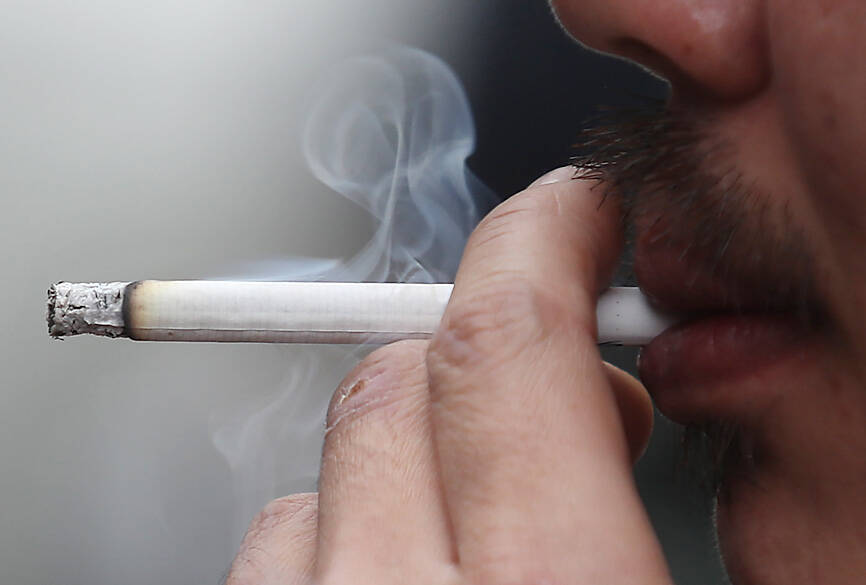Twenty-six percent of the nation’s junior, senior and vocational-high school students live in environments that expose them to secondhand smoke, the Health Promotion Administration (HPA) said, citing its latest survey as it urged people to quit smoking.
Fewer teenagers are being exposed to secondhand smoke at home each year, as the overall rate of tobacco use has been declining, the agency said.
The latest survey results showed that 26.3 percent of junior-high school students were exposed to secondhand smoke at home last year, down from 30.7 percent in 2019, while the rate for senior and vocational-high school students was down from 30.5 percent to 26.2 percent, it said.

Photo: CNA
However, secondhand smoke can be an “invisible killer,” causing about 3,000 deaths in Taiwan per year, and even short-term exposure can lead to higher risks of cardiovascular diseases, it said.
The WHO’s International Agency for Research on Cancer has listed secondhand smoke as a Group 1 carcinogen, said Liu Chia-hsiu (劉家秀), a senior technical specialist at the HPA’s Smoke Hazard Prevention Division.
Studies in other countries have shown that teenagers whose parents smoke are more likely to suffer from bronchitis and pneumonia compared with those whose parents do not smoke, she said.
Secondhand smoke might also lead to more serious and frequent asthma attacks in teenagers, while infants who are exposed to secondhand smoke might die of sudden infant death syndrome, Liu said, adding that exposure before or after birth can lead to worse lung conditions.
Smoking on balconies or in bathrooms does not prevent exposure of family members to secondhand smoke, as smoke can be absorbed by hair, skin, clothes, curtains and carpets for up to half a year, pediatrician Chen Mu-jung (陳木榮) said.
People who want to quit smoking can seek help from the HPA’s smoking cessation services provided by doctors and health professionals in 3,500 medical institutions across the country, the HPA said.
People can also call the smoking cessation hotline for professional support at: 0800-636-363.

Alain Robert, known as the "French Spider-Man," praised Alex Honnold as exceptionally well-prepared after the US climber completed a free solo ascent of Taipei 101 yesterday. Robert said Honnold's ascent of the 508m-tall skyscraper in just more than one-and-a-half hours without using safety ropes or equipment was a remarkable achievement. "This is my life," he said in an interview conducted in French, adding that he liked the feeling of being "on the edge of danger." The 63-year-old Frenchman climbed Taipei 101 using ropes in December 2004, taking about four hours to reach the top. On a one-to-10 scale of difficulty, Robert said Taipei 101

Nipah virus infection is to be officially listed as a category 5 notifiable infectious disease in Taiwan in March, while clinical treatment guidelines are being formulated, the Centers for Disease Control (CDC) said yesterday. With Nipah infections being reported in other countries and considering its relatively high fatality rate, the centers on Jan. 16 announced that it would be listed as a notifiable infectious disease to bolster the nation’s systematic early warning system and increase public awareness, the CDC said. Bangladesh reported four fatal cases last year in separate districts, with three linked to raw date palm sap consumption, CDC Epidemic Intelligence

Taiwanese and US defense groups are collaborating to introduce deployable, semi-autonomous manufacturing systems for drones and components in a boost to the nation’s supply chain resilience. Taiwan’s G-Tech Optroelectronics Corp subsidiary GTOC and the US’ Aerkomm Inc on Friday announced an agreement with fellow US-based Firestorm Lab to adopt the latter’s xCell, a technology featuring 3D printers fitted in 6.1m container units. The systems enable aerial platforms and parts to be produced in high volumes from dispersed nodes capable of rapid redeployment, to minimize the risk of enemy strikes and to meet field requirements, they said. Firestorm chief technology officer Ian Muceus said

MORE FALL: An investigation into one of Xi’s key cronies, part of a broader ‘anti-corruption’ drive, indicates that he might have a deep distrust in the military, an expert said China’s latest military purge underscores systemic risks in its shift from collective leadership to sole rule under Chinese President Xi Jinping (習近平), and could disrupt its chain of command and military capabilities, a national security official said yesterday. If decisionmaking within the Chinese Communist Party has become “irrational” under one-man rule, the Taiwan Strait and the regional situation must be approached with extreme caution, given unforeseen risks, they added. The anonymous official made the remarks as China’s Central Military Commission Vice Chairman Zhang Youxia (張又俠) and Joint Staff Department Chief of Staff Liu Zhenli (劉振立) were reportedly being investigated for suspected “serious